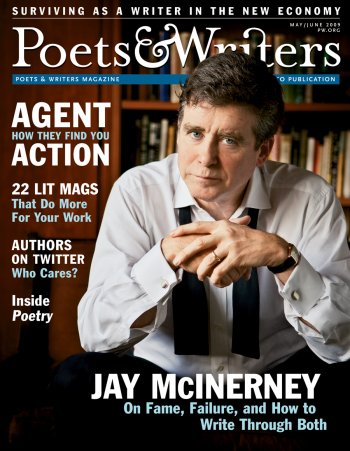
Jay McInerney on how to write through fame and failure, plus twenty-two lit mags that do more for your work, and as part of our continuing Agents and Editors series, four agents reveal what totally freaks them out about MFA students.
Jump to navigation Skip to content

Jay McInerney on how to write through fame and failure, plus twenty-two lit mags that do more for your work, and as part of our continuing Agents and Editors series, four agents reveal what totally freaks them out about MFA students.

Four agents discuss how the economy is affecting their jobs, where they’re finding new writers, and what totally freaks them out about MFA students.
Twenty-five years after Bright Lights, Big City, Jay McInerney publishes his second debut.
For poet Ann Lauterbach, the clearest and most interesting perspective comes from being on the outside.
After a slow start with big publishing houses, Joe Meno found redemption with Akashic Books. So why is his new novel being published by Norton?
Creative writers stand at the edge of a digital divide. On one side: the traditions of paper. On the other: the lure of the Internet. As glossy magazines die by the dozen and blogs become increasingly influential, we face the reality that print venues are rapidly ceding ground to Web-based publishing. Yet many of us still hesitate to make the leap.
Do editors, agents, and tenure-granting committees still look to traditional literary journals to legitimize writers?
What began as a grass-roots project showcasing the work of Portland poets, the Café Review has grown over the past twenty years to become a highly regarded journal with an international audience.
Do journal editors' colleagues and friends have an advantage over the unconnected submitter?
A literary magazine map for writers who want their work to make a mark beyond the page—to promote environmental awareness, to fuel social change, to contribute to a larger conversation, or to be read and heard.

Adam Robinson started the outdoor journal Is Reads to offer the citizens of Baltimore an unusual venue for poetry—the city itself.
Although the current recession is hammering all sectors of the literary economy, including publishers of books and magazines, booksellers, and service organizations—not to mention writers themselves—one of the community's smallest but most important components is proving particularly vulnerable.
Many in the publishing industry now consider Twitter—as they do Facebook, MySpace, and YouTube—an essential marketing venue for books and authors. But authors hoping to tweet their way to the social-networking top need more than a Twitter account—they need a game plan.
Literary MagNet chronicles the start-ups and closures, successes and failures, anniversaries and accolades, changes of editorship and special issues—in short, the news and trends—of literary magazines in America. This issue's MagNet features Witness, the Massachusetts Review, Calyx, River Teeth: A Journal of Nonfiction Narrative, and Oxford American.
Small Press Points highlights the happenings of the small press players. This issue features New Directions, Burning Deck, Siglio Press, Calyx Books, Fence Books, Hanging Loose Press, Slope Editions, Canarium Books, Octopus Books, Ugly Duckling Presse, Clear Cut Press, Featherproof Books, Paper Egg Books, Soft Skull Press, and Tupelo Press.
With so many good books being published every month, some literary titles worth exploring can get lost in the stacks. Page One offers the first lines of a dozen recently released books, including Emily Chenoweth's Hello Goodbye and Loree Rackstraw's Love As Always, Kurt: Vonnegut As I Knew Him as the starting point for a closer look at these new and noteworthy titles.
A guide to submitting writing to Poetry magazine.
Advice on rethinking the recession for writers, a group uniquely equipped to deal with economic instability.
New inventions—the alphabet, the printing press—have changed the art of storytelling over time, and now the Internet is revolutionizing the way we imagine narrative.